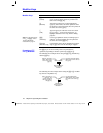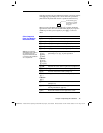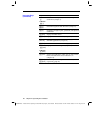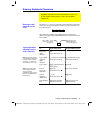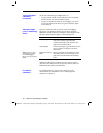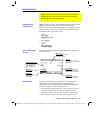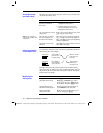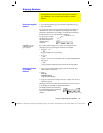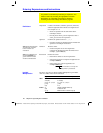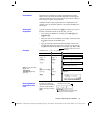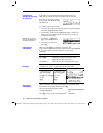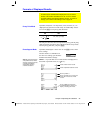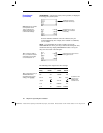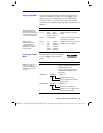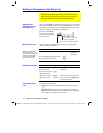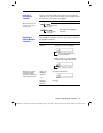
26 Chapter 2: Operating the Calculator
02OPER.DOC TI
-
89/TI
-
92 Plus: O
p
erating the TI
-
89/TI
-
92 Plus (English) SusanGullord Revised:02/23/01 1:06 PM Printed: 02/23/01 2:11 PM Page 26 of 44
Expression Consists of numbers, variables, operators, functions,
and their arguments that evaluate to a single answer.
For example:
p
r
ñ
+
3
.
¦
Enter an expression in the same order that it
normally is written.
¦
In most places where you are required to enter a
value, you can enter an expression.
Operator Performs an operation such as +,
ì
,
ù
, ^.
¦
Operators require an argument before and after the
operator. For example:
4+5
and
5^2
.
Function Returns a value.
¦
Functions require one or more arguments
(enclosed in parentheses) after the function. For
example:
‡
(5)
and
min
(5,8)
.
Instruction Initiates an action.
¦
Instructions cannot be used in expressions.
¦
Some instructions do not require an argument. For
example:
ClrHome
.
¦
Some require one or more arguments. For
example:
Circle
0,0,5
.
The
TI
-
89 / TI
-
92 Plus
recognizes implied multiplication, provided it
does not conflict with a reserved notation.
If you enter: The TI
.
89 / TI
.
92 Plus interprets it as:
Valid
2
p
2
ù
p
4 sin(46) 4
ù
sin(46)
5(1+2)
or
(1+2)5 5
ù
(1+2)
or
(1+2)
ù
5
[1,2]a [a 2a]
2(a) 2
ù
a
Invalid
xy
Single variable named
xy
a(2)
Function call
a[1,2]
Matrix index to element
a[1,2]
Entering Expressions and Instructions
You perform a calculation by evaluating an expression. You
initiate an action by executing the appropriate instruction.
Expressions are calculated and results are displayed
according to the mode settings described on page 29.
Definitions
Note: Appendix A describes
all of the
TI
-
89 / TI
-
92 Plus
built-in functions and
instructions.
Note: This guidebook uses
the word command as a
generic reference to both
functions and instructions.
Implied
Multiplication
For instructions, do not put the
arguments in parentheses.



